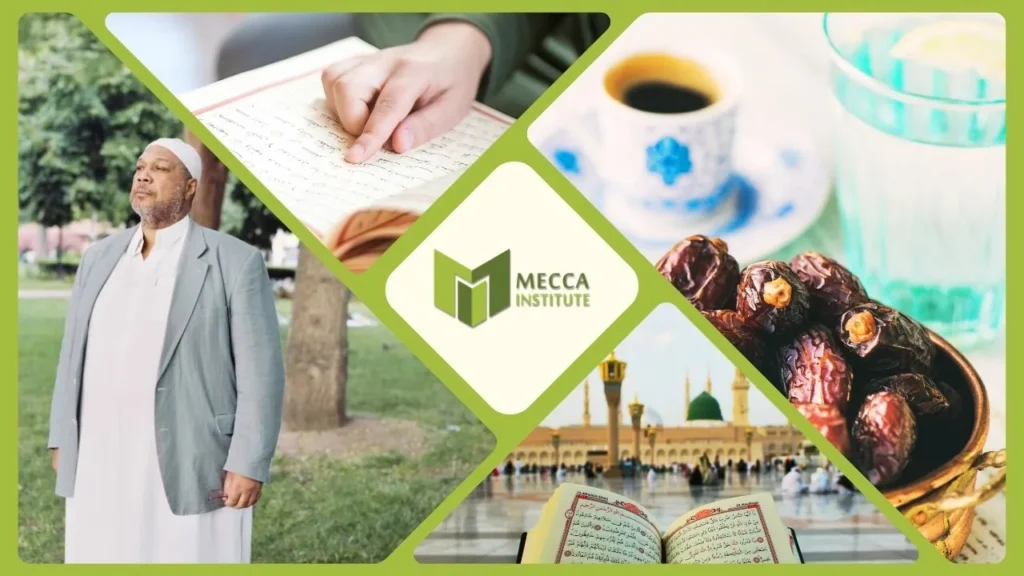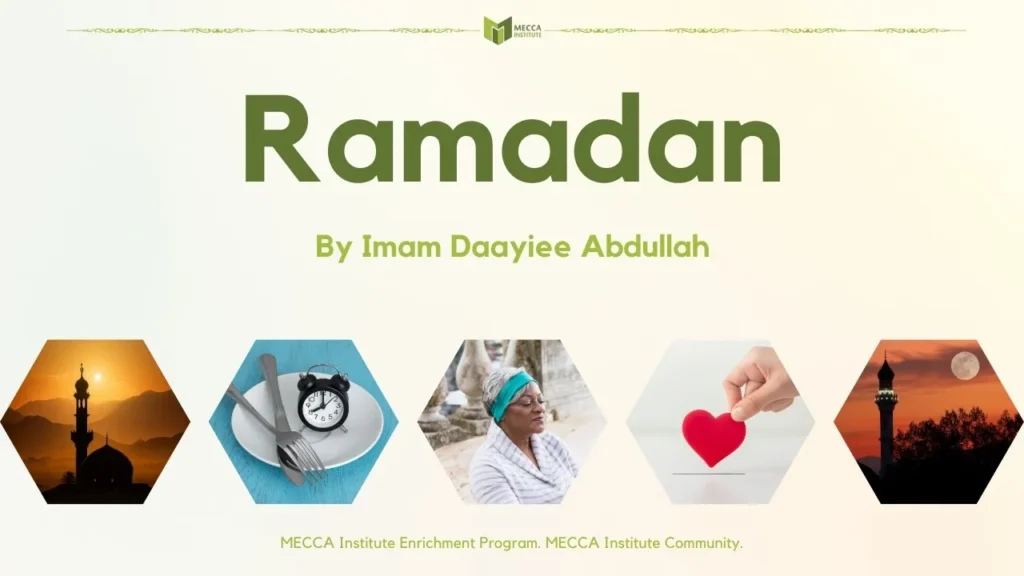Ramadan is a month of reflection, says Imam Daayiee Abdullah, noting that Muslims abstain from more than food during the holy month.
Our faith challenges us to be better. Like all of the pillars of Islam, fasting is an obligatory practice that has a lot of meaning for every Muslim.
We are called to fast not just to abstain from food but also from negativity, both in us and in others. People are kinder on the streets, restaurant owners close daylight hours so as not to tempt people, and there is an internal dialogue happening.
It is true that a majority of Muslims overeat at night to compensate for what they did not consume that day, but many are reflective.
As this guide will show, Muslim practices around Ramadan are diverse.
Ramadan Basics
From not eating daylight hours to feeling like your whole month is a series of spiritually filled moments, Ramadan can be a month of incredible experiences.
What is Ramadan? Ramadan is the ninth month of the Islamic calendar. It is famous around the world because this is the month when Muslims fast, from dawn to sunset. Fasting is not just from food, though, as Muslims abstain from a lot of other things, including drinking liquids like water.
To break the fast at sunset, which is called “iftar” (إفطار), Muslims tend to start with water and dates. Breaking the fast this way dates back to the 7th Century, and it is a practice associated with the Prophet Muhammad and early Muslims.
Ramadan is probably the most important month in the entire Muslim calendar, and its end is met with the celebration of Eid al-Fitr. This is a festival where Muslims gather for communal prayers, feasting, exchanging gifts, and more.
Ramadan Traditions

Muslims around the world, including Progressive Muslims, have created unique local traditions for Ramadan. There are pre-fast meals, meals to break the fast, and other traditions.
Pre-fast meals are eaten across Muslim countries around the world right before the fast commences. From an hour to two hours before dawn, families gather and have a light meal, especially since some will go back to sleep after prayers.
Meals to break the fast, on the other hand, are eaten after sunset, ending the day’s fast. They tend to be much more elaborate meals, as well as on the heavier side. Meats, big meals, and sweets are all part of it.
Of course, Ramadan’s fasting is more than food, and Muslims abstain from other things, including drinking water.
Likewise, Ramadan requires abstaining from bad habits like lying, gossiping, and more.
Finally, after a long month of fasting, Muslims end Ramadan with a big celebration called Eid. The Eid following Ramadan, called Eid al-Fitr, is bigger than Eid al-Adha, Mawlid, and the Muslim New Year all combined.
Preparing for Ramadan
Muslims get ready for Ramadan weeks or months in advance. To prepare for Ramadan, there are several areas of concern, including mental, physical, spiritual, charity, and time management.
First, we start by creating time each day to reflect on what Ramadan means to us. It can be five minutes in the morning, ten minutes before bed, or even a portion of your lunch break at work.
As we do that, we also prepare the body. Physical preparation requires waking up earlier, slowly transitioning to eating heavier foods at night, and doing more physical activities to make the body stronger.
We then prepare spiritually. Increasing how much of the Quran we read daily, taking extra time for prayers, and engaging in dhikr are some of the ways Muslims prepare traditionally.
Charity is another area to prepare. Prior to the Eid al-Fitr prayer marking the conclusion of Ramadan, every adult Muslim with surplus food must give zakat al-Fitr. And, of course, sadaqah (voluntary charity) is encouraged throughout Ramadan. Consider giving to MECCA Institute (we are a non-profit organization).
Finally, time management is another area. We plan ahead the entirety of Ramadan with mundane schedules so that there is no need to think about it, as well as aligning schedules to meet spiritual needs.
Pre-Fast Sleep
Getting good sleep prior to fasting is an important task every Muslim must consider. Sleep helps us prepare for the day ahead.
Adequate sleep makes sure that the body is well-rested because energy is essential for enduring the fasting period. Having a good sleep will prevent experiencing excessive fatigue.
Likewise, sufficient sleep helps regulate bodily functions, including metabolism and hormone levels. This is very important because these functions can be disrupted by sleep deprivation.
Similarly, getting enough rest means you will get to wake up feeling refreshed. That feeling will help you focus on spiritual practices better. Your prayers, reflections, and communication with others will be so much easier.
Meanwhile, preparing for sleep means getting used to sleeping early since we have to get up early for a pre-fast meal.
Typically, people wake up about an hour or two before dawn to eat their final meal of the day so that they aren’t too hungry later.
Fasting
Fasting is not just about food, but rather than listing what you need to abstain from, let’s look at some of the items that invalidate or break one’s fast.
What not to do during Ramadan? Consuming food, drink, or medications intentionally, smoking, engaging in sexual activity, vomiting intentionally, and menstruating are some of the things that easily break a fast.
Likewise, anything that enters the body through the mouth, nose, or any other means and provides nourishment or hydration can invalidate the fast. This is especially difficult for those in dry areas who cannot use nose drips.
Similarly, speaking ill of others, gossiping, lying, and cheating people are all actions that lead to breaking a fast. Ramadan is about being a good person.
Of course, there are differences in interpretation among Islamic scholars regarding certain activities, including medications.
Pre-Fast Meal
The Islamic pre-fast meal is called “suhoor” (سحور) in Arabic and is loaned to most other languages. Muslims can eat until the call of the morning prayer. Naturally, there are many types of foods to choose from.
Traditional suhoor meals include foods that give us sustained energy throughout the day. In many Muslim cultures, these foods include dates, grains, proteins, bread, fruits, vegetables, and plenty of water.
Prophet Muhammad is reported to have had simple meals for suhoor. Dates, water, and a small amount of bread and milk were supposedly his typical meal for suhoor. He promoted simplicity in eating, encouraging his followers to avoid excessiveness.
Today, Muslims around the world serve diverse foods. Ogi is the most popular suhoor meal in Nigeria, and this fermented cereal pudding is made by soaking grains and then milling and sieving.
Egyptians love their ful medames, made from cooked fava beans, for suhoor. Many years ago, Al-Ahram newspaper said that most families serve it with tea and bread.
In Pakistan, where the pre-fast meal is called “sehri,” the most popular meal is pheni, a type of vermicelli prepared by frying it in milk after making a dough from semolina and soaking it in ghee.
Hui Muslims, a Chinese community who call the pre-fast meal “feng zhaifan,” a popular dish is niang pi, a cold noodle dish that can be vegetarian or with meat like chicken, lamb, or beef.
What matters most is to eat a meal that you love and can help you to go through your fast with ease.
Meals for Breaking the Fast

In Islam, Muslims call the meal to break the fast “iftar” (إفطار), although locally it may be called something else, too. For example, in Iran, it’s called both iftar and “sobhane,” a Persian term for breakfast in general, depending on where you are.
Iftar foods are very diverse. On the Swahili coast of East Africa, a popular iftar item is mandazi, a deep-fried pastry similar to doughnuts. Along with that, there are delicious rice cakes called Vitumbua.
In Morocco, a popular item is chebakia, a rose-resembling pastry dish. Chebakia, which is also known by various names, originated with the Berber people, and it is also popular in Algeria. Along with that, there is a mix of sweet, savory foods, bread, other pastries, and fruits.
Some countries have Ramadan-specific foods. For example, in Turkey, there is the Ramazan pidesi, which literally means “Ramadan flatbread.” This pidesi is enjoyed with a lot of other things, including a lentil soup called mercimek çorbası.
China’s historic capital of Xi’an is Huimin Jie, a Muslim quarter, where yangrou paomo, a pita bread-soaked lamb soup, is very popular for iftar. Along with that, you can enjoy steamed dumpling soup, which the area is famous for in general.
Ramadan Evening Prayers
A special nightly prayer is offered during Ramadan. Taraweeh (تراويح), which means relaxation in Arabic, are extra prayers performed by Sunni Muslims after the obligatory Isha prayer.
The atmosphere in the mosques is serene. Sunni worshippers gather together in neighborhood mosques to recite long portions of the Quran, lasting about 2 hours.
Shia Muslims, on the other hand, are not allowed to gather for these prayers. Nawafil (نوافل), which means optional prayers, are extra prayers performed by Shia Muslims in their private homes. They can last until midnight.
Like the Sunnis and Shia, Sufis have their own Ramadan evening programs. Tahajjud (تهجد), which means vigil in Arabic, is a type of prayer that Sufis choose to do all night long. Unlike taraweeh and nawafil, tahajjud is highly invasive and will see its performers napping most of the next day between prayers.
Many other denominations of Islam do their own nightly prayers, dhikr, meditation, and so on.
Eid al-Fitr
Once the Ramadan month is over, Muslims celebrate Eid al-Fitr (الفطر), a festival to mark the ending of the fasting month.
This festival takes place on the first day of the following month, Shawwal, the tenth month on the Islamic calendar.
As the biggest celebration of the year, Eid al-Fitr sees Muslims celebrating with communal prayers, feasting on sweets, giving of gifts, and acts of charity.
One of my favorite Ramadan traditions is the children receiving “Eidi,” money from the elders in the family that is meant to make them feel blessed.
In most major Muslim countries, the streets exude lively energy, with busy markets, colorful decorations, joyful laughter, and unity among people celebrating together.
Ramadan vs Intermittent Fasting
Ramadan and intermittent fasting may sound similar to non-Muslims, but they are very different. Fasting in Ramadan is a religious practice for Muslims. We fast from dawn until sunset for an entire month.
This fasting is a form of worship because we are following God’s commandments. On a human level, it is about self-discipline. Fasting in Ramadan includes abstaining from food, drink, and many other eating habits during daylight hours.
Intermittent fasting, on the other hand, is a healthy approach. Unlike fasting in Ramadan, it is not all day, and it is not fasting from all things since you can drink water, coffee, and other non-caloric foods in intermittent fasting. Yes, some individuals cycle between periods of eating and fasting, and most of them include sleeping hours in the count.
That said, Muslims do have their own kind of intermittent fasting. For example, Sunni Muslims may fast every Monday. Like fasting in Ramadan, though, it is the entire daylight hours. But they are not fasting on Sunday or Tuesday, and the rest of the week, so it is somewhat intermittent in that way.
Conclusion
The Muslim calendar is dotted with many celebrations, events, and dates, but nothing compares to Ramadan.
During Ramadan, neighborhoods in Muslim communities take on a serene ambiance. For example, busy markets transform into quiet spaces.
Families gather for iftar, mosques fill with worshippers for nightly prayers, and a spirit of devotion prevails.
When the month of fasting is over, Muslims celebrate Eid, praying together, greeting one another, exchanging gifts, and so on.
May Allah continue to guide us all.
Imam Daayiee Abdullah is the Executive Director of MECCA Institute and the author of “Progressive Islam,” a historic book that defines Progressive Islam.


Pingback: Eid al-Fitr Guide to Celebrate the End of Ramadan with Traditions
Pingback: Islamic New Year Guide to Celebrate This Muslim Holiday - MECCA Institute
Pingback: Mawlid Guide for the Beautiful Celebration of Prophet Muhammad - MECCA Institute
Pingback: Sharia Law Countries Guide to Use for Proactive Safety - MECCA Institute